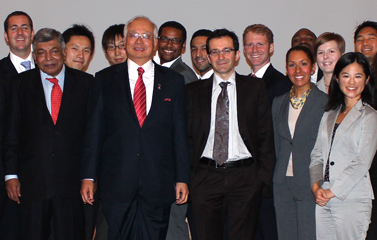Students on Immersion Experience Program Present Findings to Malaysian Prime Minister
 Prime Minister Najib Razak with HBS students and Associate Professor Diego Comin. Prime Minister Najib Razak with HBS students and Associate Professor Diego Comin.
BOSTON—Thirty second-year Harvard Business School (HBS) students recently had the unique opportunity to meet with Prime Minister Najib Razak of Malaysia in Kuala Lumpur. During the meeting, the students presented the findings of the analysis they conducted for almost four months regarding the drivers and barriers to Malaysian productivity and competitiveness. In addition, they provided recommendations to alleviate impediments and foster rapid growth. The HBS students were in Malaysia on an Immersion Experience Program (IXP) led by Associate Professor Diego Comin, an authority on productivity growth and technology adoption. An IXP is an off-campus learning opportunity for second-year MBA students. A key component of the program is the opportunity to engage in field-based exercises that allow students to apply leading ideas in managerial practice and interact directly with communities and business leaders. "Prime Minister Najib was extremely approachable, and he enthusiastically engaged with the students. He listened carefully to our policy recommendations, asked very specific questions, and early indicators suggest that Mr. Najib is keen to embrace some of our ideas," said Professor Comin. "This is a huge success for the Malaysia IXP, and it is very gratifying for the students to see their work recognized and appreciated." HBS faculty members have a long history in Malaysia. A famous case written in 2001, titled Capital and Control and taught in the MBA program for nine years, explained how Malaysia had coped with the Asian financial crisis of 1997-98. After visiting Malaysia several years ago, Professor Comin wrote a case called Malaysia: People First? that has been taught to thousands of MBA students and executives since 2010. On that trip, he discovered that the country was at an historic juncture. Investment and growth had slowed, and Malaysia's competitiveness had been compromised. Few people understood the forces that were causing this slowdown. Picking up from that inflection point, the 2012 Malaysia IXP explored the forces behind the ongoing slowdown in investment and growth. Preparing for the in-country portion of the program, students studied the Malaysian economy and its competitiveness for three months on campus at HBS. On the ground, divided into six teams, the students tackled a variety of projects, some dealing with specific companies, others with broad sectors of the economy such as electronics. Still others cut across sectors like entrepreneurship and education. Collectively, the projects allowed the students to get an overview of the Malaysian economy and the challenges it faces. In Malaysia, the students travelled around the country and designed their agendas to conduct their projects, meeting with hundreds of people from all walks of life. These meetings provided them with a unique perspective that combined the objectivity of a distant observer with the local knowledge acquired through boots-on-the-ground field work. Most important, their analysis applied rigorous scientific methods and frontier knowledge. "The IXP was a truly transformational experience. It gave me a chance to learn how business and government can work together to achieve the goal of economic development. In Malaysia, we had the opportunity to interact with hundreds of government and business leaders. I am grateful for this experience, and I look forward to applying what I learned after graduation," said Sean Ahn, a second-year MBA student. |
Zeenat Potia
617-495-6156
zpotia+hbs.edu
About Harvard Business School
Harvard Business School, located on a 40-acre campus in Boston, was founded in 1908 as part of Harvard University. It is among the world's most trusted sources of management education and thought leadership. For more than a century, the School's faculty has combined a passion for teaching with rigorous research conducted alongside practitioners at world-leading organizations to educate leaders who make a difference in the world. Through a dynamic ecosystem of research, learning, and entrepreneurship that includes MBA, Doctoral, Executive Education, and Online programs, as well as numerous initiatives, centers, institutes, and labs, Harvard Business School fosters bold new ideas and collaborative learning networks that shape the future of business.
